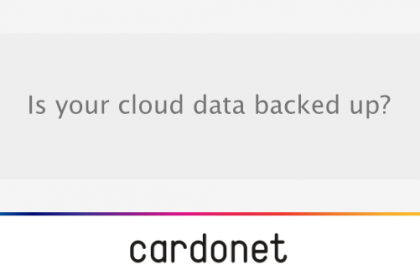
Cloud computing has become increasingly popular over the last few years. The benefits of it mean that businesses, both large and small, have been adopting the cloud. Essentially, cloud computing is a remote hosting server which enables you to access software via the internet. It is a mechanism for storing and sharing data which is then accessible at any time from virtually anywhere in the world.
Benefits of using the cloud include lower costs, accessibility, scalability, disaster recover and security. However, a common misconception that many people have is that once your data is on the cloud, it is automatically backed up. This is not strictly true and you should be manually backing up your data.
Microsoft explicitly recommends using a third-party backup solution to protect your Office 365 data in the Microsoft Services Agreement: if you don’t have a solution, your data is at risk.
Backing up business cloud data involves servers being backed up and stored on a server in a different physical location. In any circumstance, the importance of backing up your data cannot be stressed enough. Having your Office 365 data backed up on a remote server is important because it allows:
- Rapid data recovery
- Flexible storage
- Reliable disaster recovery
- Safe storage of data and apps
The remote server and storage solutions are usually hosted by a third-party service provider who charge a fee based on the amount of data, number of users and other such factors. Using a remote server, as part of the 3-2-1 rule is the safest way to protect your data. The 3-2-1 rule involves having three copies of your data on two different media with one copy off-site.
Backing up the cloud is important for disaster recovery. Cloud-based disaster recovery is more flexible as there are more solutions; organisations are not tied to a particular type of architecture so they can choose an option that meets their needs, regardless of where they are on their cloud journey. Additionally, cloud disaster recovery is cheaper and faster than traditional; backing up from the cloud is far easier than physical duplication. Indeed, by nature, it is quicker; if a virtualised server fails, another can be put up in minutes.
Scheduling your backups is fundamental to consistent and continuous data protection. Backups should occur at least daily, depending on the size of your business and the amount of data handled. The exact frequency is something to be discussed with your IT service provider, depending on their RTO (Recovery Time Objective) and RPO (Recovery Point Objective). Incremental backups mean that only new or updated files are stored, which saves time and keeps storage demands down. However, full backups should be taken periodically as these allow for quick restoration of a complete system.
If you are worried about your business cloud data, call us on +44 203 034 2244 or +1 323 984 8908. Alternately, you can contact us online. We will be happy to help you overcome your IT challenges and provide you with managed cloud services. We have engineering bases in the United Kingdom, Europe and Southern California and our group of highly experienced engineers are available 24/7 to assist and ensure your business’ IT infrastructure is running seamlessly.



You must be logged in to post a comment.